23 july 2019
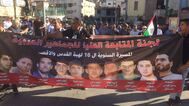
The purported apology Ehud Barak made today for the October 2000 killing of 13 Palestinian citizens of Israel lacks all value so long as no indictments have been filed against the Israeli police officers responsible for the killings, said Adalah, the Legal Center for Arab Minority Rights in Israel.
"This purported apology also has no meaning while police violence against Palestinian citizens of Israel continues to this very day," it said in a press release responding to the apology by Barak, then prime minister of Israel, for the police killing of the 13 Palestinians.
Adalah represented the families of the 13 young Palestinians killed by Israel police in October 2000.
"Ehud Barak was directly responsible for the killing of 13 Arab youths in October 2000. He ordered Israeli police to deploy deadly means – including snipers – to reopen Highway 65 during the demonstrations, and he remained indifferent to the resultant killing and wounding of hundreds of protestors on 1-2 October 2000," said Adalah. "Barak's orders also justified the police's continued use of snipers during the subsequent days of protest."
Barak, who now heads the Israel Democratic Party and intends to run in the September Israeli elections, said in a radio interview today that protesters should not be killed by their country's security.
"There is no place for protesters to be killed by their country's security forces. I bear responsibility for everything that happened during my tenure as prime minister, including the October 2000 events,” he said. "Once again I want to expresses condolences and apologize to the families whose pain must be infinite."
Not a single Israeli officer or official has been indicted for the killings and the Police Investigation Unit decided in 2005 not to pursue any indictments against its members. In January 2007, the Israeli Attorney General also closed the investigation files into the killings.
"This purported apology also has no meaning while police violence against Palestinian citizens of Israel continues to this very day," it said in a press release responding to the apology by Barak, then prime minister of Israel, for the police killing of the 13 Palestinians.
Adalah represented the families of the 13 young Palestinians killed by Israel police in October 2000.
"Ehud Barak was directly responsible for the killing of 13 Arab youths in October 2000. He ordered Israeli police to deploy deadly means – including snipers – to reopen Highway 65 during the demonstrations, and he remained indifferent to the resultant killing and wounding of hundreds of protestors on 1-2 October 2000," said Adalah. "Barak's orders also justified the police's continued use of snipers during the subsequent days of protest."
Barak, who now heads the Israel Democratic Party and intends to run in the September Israeli elections, said in a radio interview today that protesters should not be killed by their country's security.
"There is no place for protesters to be killed by their country's security forces. I bear responsibility for everything that happened during my tenure as prime minister, including the October 2000 events,” he said. "Once again I want to expresses condolences and apologize to the families whose pain must be infinite."
Not a single Israeli officer or official has been indicted for the killings and the Police Investigation Unit decided in 2005 not to pursue any indictments against its members. In January 2007, the Israeli Attorney General also closed the investigation files into the killings.
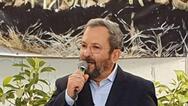
The former PM says 'there's no place for protesters to be killed by their country's security forces' in response to an op-ed written by the left-wing politician, calling on Barak to apologize for his part in the killing of 13 Israeli Arabs
A former prime minister has apologized for his role in the violent thwarting of Palestinian riots that resulted in 13 Arab demonstrators being shot by police nearly two decades ago.
Ehud Barak, who has made a political comeback ahead of September's elections, now heads the Israel Democratic Party and hopes to unseat Prime Minister Benjamin Netanyahu, who has recently become the longest serving primer in Israel's history.
"There is no place for protesters to be killed by their country's security forces," Barak said Tuesday in an Israel Radio interview. "I bear responsibility for everything that happened during my tenure as prime minister, including the October 2000 events,” he added.
"Once again I want to expresses condolences and apologize to the families whose pain must be infinite."
Barak was responding to an op-ed written by a parliament member from the left-wing Meretz party who called on him to apologize for the October 2000 killings, which came in the opening weeks of the Second Intifada, when he was serving as prime minister.
The episode - dubbed by the media as “the October events” - were a series of protests in Arab cities in northern Israel that swiftly turned violent, escalating into large-scale rioting by Israeli Arabs throughout the entire country.
This led to counter-protests by Israeli Jews, which resulted in clashes with the police and eventually in the deaths of 13 Arab demonstrators.
A former prime minister has apologized for his role in the violent thwarting of Palestinian riots that resulted in 13 Arab demonstrators being shot by police nearly two decades ago.
Ehud Barak, who has made a political comeback ahead of September's elections, now heads the Israel Democratic Party and hopes to unseat Prime Minister Benjamin Netanyahu, who has recently become the longest serving primer in Israel's history.
"There is no place for protesters to be killed by their country's security forces," Barak said Tuesday in an Israel Radio interview. "I bear responsibility for everything that happened during my tenure as prime minister, including the October 2000 events,” he added.
"Once again I want to expresses condolences and apologize to the families whose pain must be infinite."
Barak was responding to an op-ed written by a parliament member from the left-wing Meretz party who called on him to apologize for the October 2000 killings, which came in the opening weeks of the Second Intifada, when he was serving as prime minister.
The episode - dubbed by the media as “the October events” - were a series of protests in Arab cities in northern Israel that swiftly turned violent, escalating into large-scale rioting by Israeli Arabs throughout the entire country.
This led to counter-protests by Israeli Jews, which resulted in clashes with the police and eventually in the deaths of 13 Arab demonstrators.
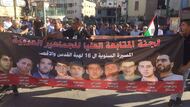
Arab MKs hold a banner with faces of those killed during October 2000 riots
Barak's apology was met with a lukewarm response from members of both the Meretz party and the ruling Likud.
"Barak is desperate … his party is barely passing the threshold and his political comeback has failed,” said the Meretz party in a statement. “The main question is why Barak insists on staying in politics, knowing he won’t be prime minister again.”
"We are still waiting for Ehud Barak's apology for being the worst prime minister in Israel's history," said Likud's statement.
Barak's apology was met with a lukewarm response from members of both the Meretz party and the ruling Likud.
"Barak is desperate … his party is barely passing the threshold and his political comeback has failed,” said the Meretz party in a statement. “The main question is why Barak insists on staying in politics, knowing he won’t be prime minister again.”
"We are still waiting for Ehud Barak's apology for being the worst prime minister in Israel's history," said Likud's statement.
2 oct 2016
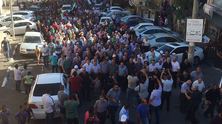
An event took place Friday in Sakhnin commemorating the 12 Arab-Israeli protesters who were killed during the riots that took place 16 years ago. All 13 Joint List MKs attended.
A memorial rally took place on Friday, marking 16 years since the October 2000 riots - during which 12 Arab-Israeli protesters were killed - took place. All 13 of the Knesset members from the Joint List party (a party mainly representing the Arab-Israeli sector) attended the event, as did several other prominent Arab-Israeli public figures.
Former MK Mohammad Barakeh, speaking at the rally, said the state of Israel did not the right lesson from the October riots, and that it was attempting to eliminate the Arab-Israeli political leadership, illegalize it, and grind down the Arab-Israeli civilian population.
“Our spirits will not be broken, we are shunned from all events, and suddenly it’s important to the state of Israel whether or not we participate in Shimon Peres’ funeral. Suddenly they miss us? It’s not our priority whether to participate or not. We have problems with lands, homes up for demolition, and what not,” he added.
The October 2000 riots broke out a few days after the Second Intifada (nicknamed the “Al-Aqsa Intifada” by Palestinians, since one of its main claimed catalysts was the way Israel was handling the Temple Mount area, which houses the Al-Aqsa mosque), in October 2000. On October 1, 2000, Israeli Arabs began violently protesting in several Arab-Israeli towns and villages across Israel, in solidarity with Palestinian protesters who had been rioting for several days.
The dispersal of the Arab-Israeli riots (which were generally geographically disconnected to the Palestinian rioting that took place mainly in Gaza, the West Bank, and East Jerusalem) involved the deaths of 12 Arab-Israelis and one non-Israeli Palestinian civilian, as well as a Jewish woman who was killed by a thrown stone.
In the aftermath of the riots, the Or Commission, headed by Supreme Court Justice Theodor Or, which rebuked several government ministers, high-ranking officers in the Israel Police, and leaders of the Arab-Israeli public.
A memorial rally took place on Friday, marking 16 years since the October 2000 riots - during which 12 Arab-Israeli protesters were killed - took place. All 13 of the Knesset members from the Joint List party (a party mainly representing the Arab-Israeli sector) attended the event, as did several other prominent Arab-Israeli public figures.
Former MK Mohammad Barakeh, speaking at the rally, said the state of Israel did not the right lesson from the October riots, and that it was attempting to eliminate the Arab-Israeli political leadership, illegalize it, and grind down the Arab-Israeli civilian population.
“Our spirits will not be broken, we are shunned from all events, and suddenly it’s important to the state of Israel whether or not we participate in Shimon Peres’ funeral. Suddenly they miss us? It’s not our priority whether to participate or not. We have problems with lands, homes up for demolition, and what not,” he added.
The October 2000 riots broke out a few days after the Second Intifada (nicknamed the “Al-Aqsa Intifada” by Palestinians, since one of its main claimed catalysts was the way Israel was handling the Temple Mount area, which houses the Al-Aqsa mosque), in October 2000. On October 1, 2000, Israeli Arabs began violently protesting in several Arab-Israeli towns and villages across Israel, in solidarity with Palestinian protesters who had been rioting for several days.
The dispersal of the Arab-Israeli riots (which were generally geographically disconnected to the Palestinian rioting that took place mainly in Gaza, the West Bank, and East Jerusalem) involved the deaths of 12 Arab-Israelis and one non-Israeli Palestinian civilian, as well as a Jewish woman who was killed by a thrown stone.
In the aftermath of the riots, the Or Commission, headed by Supreme Court Justice Theodor Or, which rebuked several government ministers, high-ranking officers in the Israel Police, and leaders of the Arab-Israeli public.
30 sept 2016
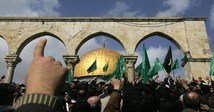
The Palestinians in the 1948 occupied lands will mark soon the 16th anniversary of the October events in 2000 that broke out after former Israeli premier Ariel Sharon desecrated the Aqsa Mosque and led to the second intifada (uprising).
13 Palestinians were killed by Israeli policemen during the October events in 1948 occupied Palestine at the time.
The Arab follow-up committee said it finished all preparations to commemorate the October events, which would include a massive march and visits to the tombs of the 13 martyrs.
13 Palestinians were killed by Israeli policemen during the October events in 1948 occupied Palestine at the time.
The Arab follow-up committee said it finished all preparations to commemorate the October events, which would include a massive march and visits to the tombs of the 13 martyrs.
